Rising above tragedy to become the heart and soul of a refugee community
Karen Burmese refugee Evelyn Kunoo tells a heartbreaking story about her family that is emblematic of refugees across the world.
Her sister’s husband was killed fighting the Burmese Government leaving a widow and an infant son. A year later Evelyn’s sister developed terminal leukaemia and asked her to look after the boy and, when he was old enough to understand, pass on to him his father’s military uniform.
Soon after, relatives from his father’s family snatched the boy away. It was 20 years before Evelyn was able to find him – by then a grown man with his own family – and give him his father’s uniform.
As he unwrapped the package containing the clothing, out slid a letter written two decades earlier by his dying mother.
Her story is typical of the heartbreak and destruction that conflict and persecution inflicts on millions of refugee families across the globe. It represents a single teardrop in an ocean of sadness.
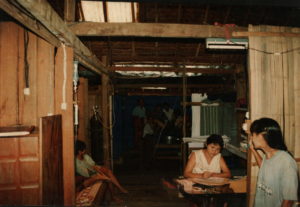 But Evelyn has risen above the tragedy of her people and the conflict that has caused their diaspora. She has become a leader and an example to her own community; a mother hen who has gathered her people around her and restored meaning to their lives.
But Evelyn has risen above the tragedy of her people and the conflict that has caused their diaspora. She has become a leader and an example to her own community; a mother hen who has gathered her people around her and restored meaning to their lives.
Evelyn is the heart and soul of an extraordinary community garden project at Werribee Park, in Melbourne’s west, that has seen the regeneration of an historic garden and – in a remarkable example of cultural cross-pollination – the blossoming of local refugee communities.
What started as a call for volunteers to help rebuild the gardens turned into a therapy session for dislocated and isolated refugee families.
Werribee Park Area Chief Ranger James Brincat says Evelyn has played a central role in the success of the project titled ‘Working Beyond the Boundaries’, a collaboration between Parks Victoria and settlement agency AMES Australia.
James says Evelyn has been responsible for bringing people from the local refugee communities into the garden and inspiring them to contribute.
“Evelyn is a leader in her community and she has become the heart and soul of the garden,” he said.
“She has recruited and organised the community members to work in the gardens and is a driving force behind the whole thing.
“What started out as community project to rebuild the old kitchen garden here at Werribee Mansion has turned out to be an incredibly successful social experiment and a model for other community engagement projects.
“Everyone involved in this is blown away by what we’ve achieved and the inspirational outcomes that have come from putting some seeds in the ground and seeing what happens – both literally and figuratively,” James said.
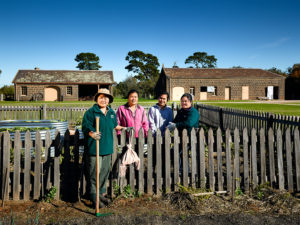 Evelyn said she felt responsible for her community and wanted to do something when she started to see rising levels of isolation and depression. When the opportunity to volunteer in the gardens came up, she jumped at it.
Evelyn said she felt responsible for her community and wanted to do something when she started to see rising levels of isolation and depression. When the opportunity to volunteer in the gardens came up, she jumped at it.
“The Karen people have a background in gardening and many of them were sitting at home with nothing to do,” she said.
“So we stared coming here. At first it was just three or four women but soon more and more came.
“The Karen come here and they feel very good, very relaxed. And we can see a sense of achievement in growing things. Before people were sitting at home drinking and playing cards.
“For me this is about helping the Karen people. I want them to progress and succeed. I want to see them get better and make good lives for themselves.
“This program I the garden encourages them to work and to get out and do things and keep healthy,” Evelyn said.
According to Parks Victoria, more than 100 people a week are now involved in the program.
“This has provided significant extra resources to the park allowing additional work to be completed and has provided a space for local communities to connect with others… while undertaking activities that range from gardening and cooking to weaving and handcrafts,” a Parks Victoria analysis says.
The experience gained as volunteers in the garden – thanks largely to Evelyn’s efforts to get them there – has seen many members of local refugee communities obtain work in the region’s commercial market gardens. One has even gained an apprenticeship as a park ranger with Parks Victoria.
With her humble background, litany of tragic family trevails and her enduring good humour in the face of it all, Evelyn’s life story reads like a Dickensian novel.
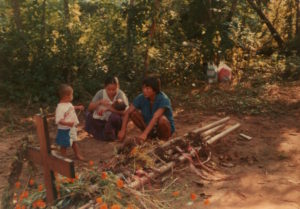 She was born and lived until she was 14 in a small village in the Karen state in Burma.
She was born and lived until she was 14 in a small village in the Karen state in Burma.
Both her parents died before she was eight; her mother when she was four and her father four years later.
She had three sisters – one was adopted out and Evelyn has never been able to find who adopted her or where she is.
From the age of eight, she had to work for her food – either as a cleaner or housekeeper and cook.
“I had no chance to study when I was young – I had to work,” she said.
Evelyn says that growing up in her village in Burma every person kept with them a small basket containing food, a cooking pot, spare clothes and personal items.
“All the time we used to have to run when the Burmese army came,” she said.
The ethnic minority Karen had been fighting a decades-long guerrilla war against the central government which had embarked on a campaign of ethnic cleansing systematically destroying and burning Karen villages.
When she was 14, Evelyn moved into the Karen Liberation Army central camp.
In the camp she was supported by the fledgling Karen state authorities and learned to read and write.
In 1984 with the war escalating, she moved to Mae La refugee camp on the Thai Burma border where she continued to study and learned nursing and midwifery.
In the camp she also met and married her husband, Kert.
“Life in the camp was very hard. We were safe and we had food but we had no money and we were not allowed outside the camp,” Evelyn said.
Evelyn spent 22 years in the camp working as a nurse and midwife.
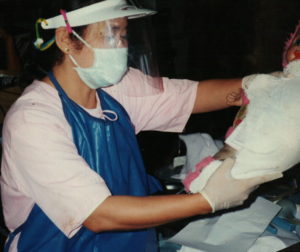 She helped deliver babies, worked on women’s health education programs including on HIV and even helped distribute condoms while explaining what they were for.
She helped deliver babies, worked on women’s health education programs including on HIV and even helped distribute condoms while explaining what they were for.
“It was good to feel useful in the camp and to have some work because some people there had nothing – they were not even registered as refugees,” Evelyn said.
“But I always wanted a better life. I wanted a life not so much for me but for my children. When we first went into the camp we thought we would only be there a year,” she said.
But it would be two decades before she would leave and in that time she had five children.
“I always felt my children would have no future in the camp. It was not good for them because I wanted them to have the opportunity to learn and to have good lives,” Evelyn said.
She said the family were overjoyed when they learned they would be coming to Australia to be resettled as refugees.
“I was so happy. I knew my children would have a chance for a good education,” she said.
But the journey to Australia presented its own challenges.
“I was very scared on the plane. I had never flown before and I thought it would fall out of the sky,” she said.
She and her family arrived in Sydney initially and didn’t realise they had to catch a connecting flight to Melbourne.
“We thought we were in Melbourne but there was no one to meet us. I was very confused and we couldn’t speak any English,” Evelyn said.
Eventually they were helped by an airport worker and put on a later plane to Melbourne.
Evelyn and her family were met by members of the Karen community in Melbourne and taken to live with a cousin in Werribee, on the city’s western outskirts.
“It was very different, living in Australia,” she said.
“I had never seen a microwave oven before. Everything was different. We had never slept on mattresses before and for the first week, we slept on the floor.
“We didn’t understand how to use the appliances or even how to open the gate at the front of the house.
“But the children were happy because we had been very poor refugees and they felt like we now had all these things,” Evelyn said.
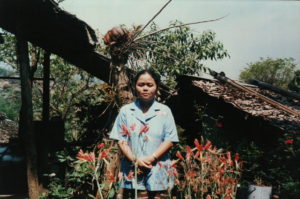 Evelyn’s children have all gone on to higher education; her eldest son is a mechanic running his own business.
Evelyn’s children have all gone on to higher education; her eldest son is a mechanic running his own business.
When not volunteering at Werribee Park or looing after her grandchildren, Evelyn and Kert love to get out into the bush.
In keeping with their Karen heritage, they love to be close to nature.
“I love to visit the bush and wild places. I love the forests – they remind me of home,” she said.
After lifetime of personal struggle and selfless work helping others, Evelyn finds peace in occasional solitude.
“It’s very good to find quiet places where there are no people,” she said.
Laurie Nowell
AMES Australia Senior Journalist












